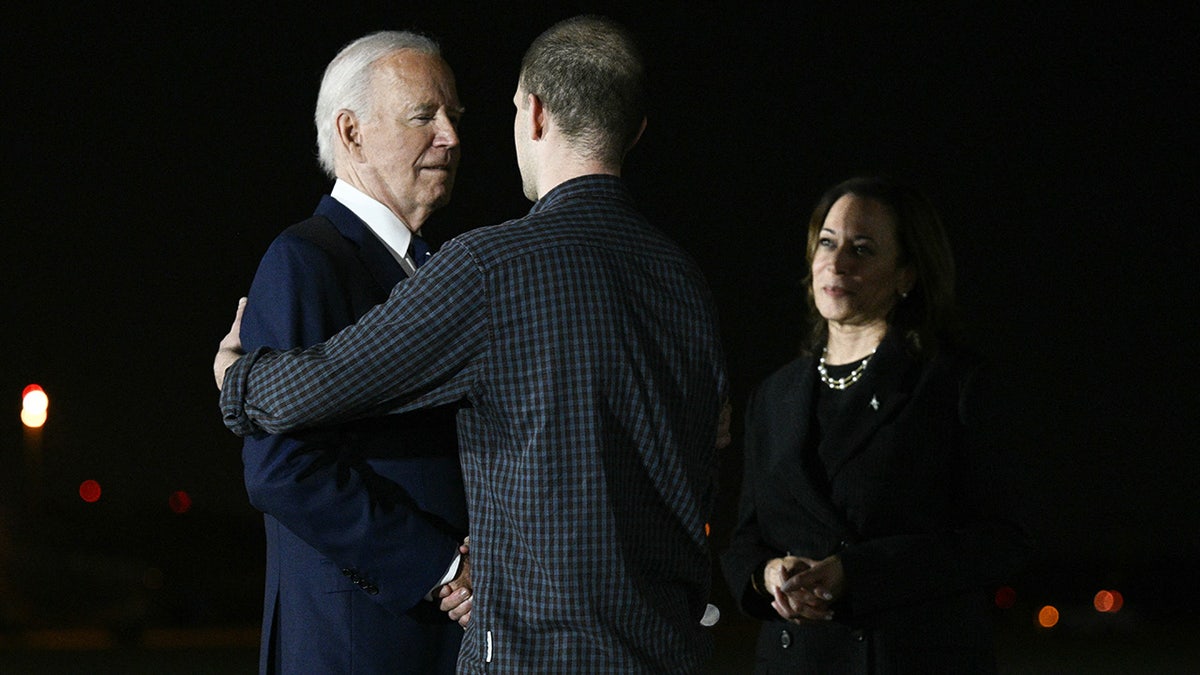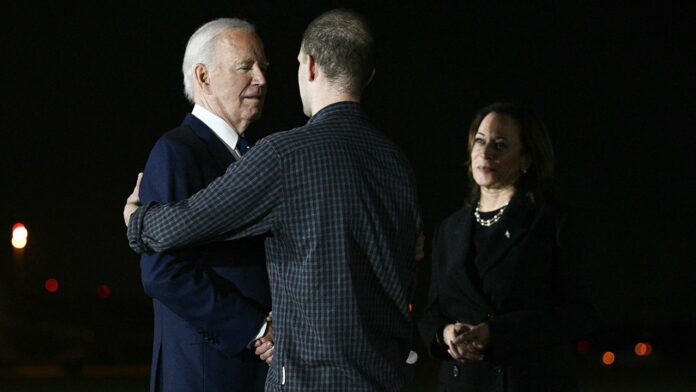NEWYou can now listen to Fox News articles!
The release of Western hostages from Russian captivity is a near-term success for the Biden administration — but it is purchased at great cost. By trading Russian spies and criminals for wrongfully imprisoned Americans and dissidents, the deal risks encouraging Russia and other authoritarian regimes to take more hostages.
The scale of the prisoner swap is large when compared to recent exchanges. Trades like this rarely feature so many individuals and governments. In total, the deal includes at least 24 people and eight countries: Belarus, Germany, Norway, Poland, Russia, Slovenia and the United States, along with Turkey, where the trade occurred.
As part of the deal, Russia agreed to release former Marine Paul Whelan and Wall Street Journal reporter Evan Gershkovich, imprisoned on false espionage charges in 2018 and 2023, respectively. Russian-American dual national Alsu Kurmasheva, a Radio Free Europe journalist sentenced to 6.5 years for supposedly “spreading false information” about the Russian military, was also freed.
Additionally, Moscow and Minsk released five German nationals imprisoned on security-related charges. The Kremlin also freed eight Russian dissidents, including the prominent opposition figures Ilya Yashin and Vladimir Kara-Murza. The latter is a U.S. green card holder and a close associate of Alexei Navalny, who died in prison last February. The Kremlin rarely releases political opponents, adding to the historic importance of this swap.

Former prisoner held by Russia US journalist Evan Gershkovich is welcomed by President Joe Biden and Vice President Kamala Harris as he arrives at Joint Base Andrews in Maryland on August 1, 2024. (BRENDAN SMIALOWSKI/AFP via Getty Images)
The price of the deal was high. In exchange, the United States and allied countries have let loose a dangerous individual: Vadim Krasikov, an FSB hitman serving a life sentence in Germany for assassinating a Chechen asylee in Berlin in 2019. He seems to be the main prize Moscow was angling to get. The other Russians include four “illegals” (spies posing as foreigners) imprisoned in Slovenia, Norway and Poland along with three U.S.-held individuals accused of cybercrime or smuggling American military-related goods.
CLICK HERE FOR MORE FOX NEWS OPINION
The White House is celebrating its prisoner swap. “The deal that secured their freedom was a feat of diplomacy,” said President Joe Biden. Unfortunately, the exchange risks incentivizing further hostage taking.
Putin’s push for prisoner swaps is a calculated strategy to secure the release of his agents while exploiting Western willingness to “trade up” for the release of innocent hostages. Worse, Biden has broken former Secretary of State George Shultz’s iron rule of hostage negotiation: don’t pay for hostages. Shultz’s reasoning: “The minute you pay for a hostage, you give an incentive to people to take more hostages.”
This latest prisoner trades like the one that the Biden White House has concluded set a dangerous precedent, eroding established international norms against hostage-taking and incentivizing Iran, terror organizations, and others to adopt similar tactics, based on Russia’s success.
Finally, the arrangement demonstrates that Moscow has clearly learned to play the hostage trading game with Washington. After the Trump administration refused to trade Whelan for the “Merchant of Death,” Viktor Bout, a notorious arms dealer believed to have ties to Russian military intelligence, the Kremlin nabbed former Marine Trevor Reed.
CLICK HERE TO GET THE FOX NEWS APP
Moscow eventually swapped Reed for U.S.-convicted Russian drug smuggler Konstantin Yaroshenko in April 2022. Russia then exchanged U.S. basketball star Brittney Griner, arrested earlier that year on drug charges, for Bout in December 2022. When the Biden team declined to trade Krasikov for Whelan, the FSB took Gershkovich as a new hostage, ultimately securing Krasikov’s release under this new deal.
The White House’s latest prisoner swap creates an obvious incentive for further hostage taking as well as hard bargaining during future hostage-swap negotiations. Not only are the costs of this latest exchange high, Biden is pushing more potential hostage negotiations onto the docket of the next president.
Source link






